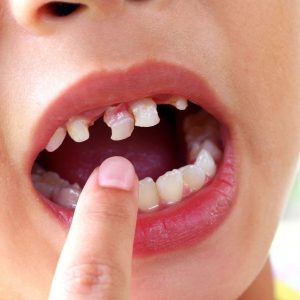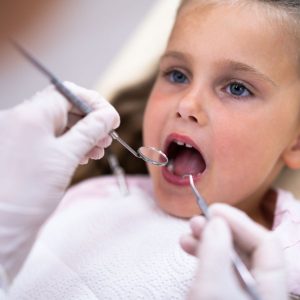Your Child’s First Dental Visit – What Parents Should Know
Visiting the dentist for the first time is an important milestone in your child’s development. Choosing a good children dentist — or a trusted dentist for kids — means more than just checking teeth, it ensures your child feels safe, supported, and develops lifelong healthy habits. At Gentle Dental Centre in Wanneroo, we believe dentistry for children should be gentle, educational, and reassuring for the whole family.
What Is the Best Age to Take a Child to the Dentist?

The Australian Dental Association recommends children visit the dentist by age one, or within six months of their first tooth appearing. These early visits allow the dentist to:
- Monitor growth and development
- Identify early signs of tooth decay or enamel issues
- Check the airway and tonsils if possible, for screening for an ENT referral
- Help parents establish good brushing and dietary habits
- Make the dentist’s chair a familiar, stress-free place
Early visits aren’t just about treatment — they build comfort and confidence, making it easier for your child to enjoy future visits.
Children’s Dental Development – What to Expect
Understanding when teeth appear (and fall out) can help parents feel more confident about what’s normal. A good dentist for kids doesn’t just check teeth for decay — they also monitor how your child’s smile is developing.
- Baby teeth (primary teeth): These usually start appearing around six months of age, and by the time your child is about three years old, most children will have a full set of 20 baby teeth.
- First permanent teeth: The first adult molars often appear around age six, which is why this age is sometimes called the “mixed dentition” stage (when both baby and adult teeth are present).
- Losing baby teeth: Children usually begin losing baby teeth around five to seven years of age, and the process continues into early adolescence.
- Teenage years: By the early teens, most permanent teeth have come through — apart from wisdom teeth, which may erupt much later.
Regular check-ups during these stages allow the dentist to:
- Spot any issues with spacing, crowding, or bite development
- Identify early orthodontic concerns
- Give parents peace of mind that everything is on track
Dentistry for children is about more than fixing problems — it’s about guiding natural development, supporting healthy habits, and stepping in early if something needs a gentle nudge in the right direction.
How to Find a Good Dentist for Kids

A good dentist for kids knows that caring for kids means more than just dental expertise. When choosing dentistry for children, look for a dentist who:
- Has experience working with children of different ages
- Uses gentle techniques and explains things in kid-friendly language
- Provides a welcoming, supportive environment
- Focuses on prevention and education
- Is conveniently located for regular family visits
At Gentle Dental Centre in Wanneroo, we’re committed to building trust with both children and parents. Our goal is to make dentistry for children positive and stress-free.
Diet and Drinks – What Helps and What Harms
What children eat and drink plays a big role in their oral health. A good children dentist will often spend just as much time talking about diet as they do about brushing, because food choices can protect teeth — or put them at risk.
Foods and Drinks That Can Harm Teeth
- Soft drinks and sports drinks – These are high in sugar and acid, which wear down enamel and cause decay. They should be avoided or saved only for special occasions.
- Juice and flavoured water – Even 100% fruit juice contains natural sugars (fructose) that can feed the bacteria responsible for cavities. Sipping juice throughout the day is especially harmful, as teeth are constantly exposed to sugar and acid.
- Dried fruit – Sticky foods like raisins or sultanas can cling to teeth and increase cavity risk.
- Frequent snacking – Constant grazing means teeth are exposed to sugars and acids more often, giving the mouth less time to neutralise the acids with saliva.

Foods and Drinks That Help Protect Teeth
- Tap water – In Perth, most tap water contains fluoride, which helps strengthen enamel and prevent decay.
- Milk (not at bedtime) – A good source of calcium and vitamin D for strong teeth and bones.
- Cheese and yoghurt – Dairy foods can help neutralise acid in the mouth and are rich in tooth-friendly minerals.
- Crunchy fruit and vegetables – Apples, carrots, and celery stimulate saliva, which helps wash away food particles and acids.
- Balanced meals over snacks – Eating structured meals, rather than constant grazing, reduces the number of acid attacks teeth are exposed to.
- Breaks between snacks – Giving teeth a chance to “rest” between eating is just as important as what children eat. Encouraging water between meals and snacks helps wash away sugars and gives the mouth time to recover naturally.
Dentistry for children isn’t about cutting out every “fun food” — it’s about balance. Offering water as the main drink, limiting sweet snacks, and encouraging crunchy, tooth-friendly foods can make a huge difference to your child’s oral health.
Fluoride and Dentistry for Children
Fluoride is one of the simplest and most effective ways to protect children’s teeth. It strengthens enamel, makes teeth more resistant to acid attacks, and can even reverse very early stages of decay. For this reason, fluoride is an important part of dentistry for children.
Fluoride in Western Australia
Most of Perth’s public water supply has been safely fluoridated since the 1960s. This means that when your child drinks tap water, they are getting the right level of fluoride to help protect their teeth every day. Bottled water, however, usually contains little or no fluoride, so tap water is the better choice for healthy teeth.
Fluoride Toothpaste
- For children under 3: use a tiny smear of fluoride toothpaste.
- From ages 3 to 6: a pea-sized amount is recommended.
- Children should spit, not rinse, after brushing so that fluoride stays on the teeth longer.
Professional Fluoride Treatments
At regular check-ups, a good dentist for kids may recommend a professional fluoride gel or varnish. This provides extra protection, especially for children at higher risk of decay.
Is Fluoride Safe?
Yes. Fluoride has been extensively studied worldwide and is safe in the correct amounts. It is endorsed by the Australian Dental Association and the World Health Organisation as an essential tool in preventing tooth decay.
Fluoride is not about replacing good brushing and diet — it works alongside them. By making fluoride part of your child’s daily routine, you’re giving their teeth an important shield against decay.
Common Concerns in Dentistry for Children
Bottles of Milk at Bedtime
Giving bottles of milk or juice at bedtime is linked to “baby bottle decay,” where sugars sit on the teeth overnight and feed decay-causing bacteria. HealthyWA advises:
Do not allow a bottle containing milk or sweetened liquids to remain in your child’s mouth after they have fallen asleep… Replace the bottle with a cup when your child is 6 to 12 months old.
This advice is backed by Australian research from the Healthy Smiles Healthy Kids study, which found that toddlers bottle-fed to sleep beyond 12 months had nearly double the rate of tooth decay and were more likely to be overweight.

When Can My Child Drink Soft Drink?
Ideally, children should avoid soft drinks altogether. They are high in sugar and acid, which erode enamel and contribute to decay. The World Health Organisation recommends limiting added sugars to less than 10% of daily energy intake for children to reduce the risk of cavities. If soft drink is consumed, it should be a rare treat, never in a bottle or sippy cup, and always followed by water to rinse the mouth. If you are giving your child a soft drink, it is preferable to serve it during a meal, so that the acid challenge is “in one go”.
Thumb Sucking
Thumb sucking is a normal self-soothing habit for many young children, but prolonged sucking can affect tooth and jaw development. The Better Health Channel notes that if thumb sucking continues beyond the eruption of permanent teeth, it “may force the teeth and jaw out of alignment.” If the habit persists past age four, a dentist for kids can provide gentle strategies to help your child stop.
Discolouration in Toddler Teeth
Discoloured toddler teeth may be linked to antibiotic use, trauma, or developmental issues. The Better Health Channel explains that “children who have to take high-dose antibiotics during a period of severe childhood illness can have development defects in the baby and permanent adult teeth.” While some staining is harmless, other cases can indicate decay. A good children dentist can assess whether treatment or monitoring is needed.
Broken Teeth in Children
Falls, sports, or accidents are common causes of chipped or broken teeth — and it’s more frequent than you might think. Research shows that about 15% of preschoolers and 20–25% of school-aged children experience dental trauma at some point. Another review reports that around 17.5% of children and adolescents suffer some form of dental injury.
If your child has a chipped or broken tooth, it doesn’t reflect on your parenting — it reflects how active and normal childhood can be! At Gentle Dental Centre, we handle these situations every day with care and expertise. Depending on the injury, treatment may include:
- Bonding to repair minor chips
- Fillings if decay or damage is present
- Extraction only in cases where the tooth cannot be saved
Early intervention helps protect your child’s comfort, dental development, and long-term oral health. Our focus is to treat gently and preserve as much of the tooth as possible.
How Do You Treat Tooth Decay in a 6-Year-Old?

Yes, even six-year-olds can get tooth decay — and it’s more common than many parents realise. If your child develops cavities, it doesn’t mean you’ve done something wrong. Genetics, diet, illness, or simply how teeth form can all play a role. At Gentle Dental Centre, you’ll never face judgement. Our focus is on helping families find solutions that protect children’s smiles.
Treatment may include:
- Fillings for cavities in baby or permanent teeth
- Fissure sealants to protect new molars from further decay
- Fluoride treatments to strengthen enamel
Use of nitrous oxide to help relax the patient - Diet and brushing advice tailored to your child’s needs
Referral to a paediatric dentist for more complex needs or anxious children
Extractions are only recommended when absolutely necessary — and every effort is made to save teeth wherever possible. Treating baby teeth matters because they hold the space for adult teeth and support speech, chewing, and jaw development.
If your child has experienced decay, the next step is prevention — and that begins with brushing. By teaching and supporting good daily brushing habits, parents can give their children the strongest defence against cavities.
How to Brush Children’s Teeth

Good oral hygiene begins with the very first tooth. To protect against cavities:
- Start brushing as soon as the first tooth erupts, using a soft toothbrush and water.
- For children under 3, use just a smear of fluoride toothpaste. From age 3, a pea-sized amount is recommended.
- Brush twice a day for two minutes — once in the morning and once before bed. We also recommend you floss teeth with floss sticks or brushes daily
- Supervise brushing until at least age 8 to ensure proper technique.
- Encourage spitting out toothpaste rather than rinsing, so fluoride stays on the teeth longer.
We understand it isn’t always easy to get kids to brush regularly — but you won’t find judgement here. Our role is to help with practical tips, encouragement, and professional support so that brushing becomes a normal, positive part of daily routine. We aren’t just dentists for kids; we’re mums with children of our own. We know how chaotic it can be in the mornings or just before bed, and have lots of tips and tricks to share with you to make teeth brushing more fun and enjoyable for both you and your child.
Preventive Dentistry for Children
The best way to protect your child’s smile is through prevention. Dentistry for children isn’t only about fixing problems — it’s about reducing the risk of them happening in the first place. Regular visits to a good dentist for kids allow small concerns to be spotted early and help families build strong oral health routines at home.
Key Preventive Treatments for Kids
- Fissure sealants – A thin protective coating placed on the deep grooves of molars, making them less likely to trap food and bacteria.
- Fluoride treatments – Strengthen enamel and reduce the risk of cavities, especially for children at higher risk of decay.
- Regular dental check-ups – Usually recommended every six months to monitor growth, development, and oral hygiene.
- Professional cleaning – Removes plaque and tartar that brushing alone can miss.
Why Prevention Matters
- Saves stress – Problems caught early are easier and less invasive to treat.
- Protects confidence – Healthy teeth mean children can smile, eat, and speak comfortably.
- Reduces costs long-term – Preventive care is almost always more affordable than restorative treatment.
Preventive dentistry for children is about building habits, education, and routine. By starting young, parents give their children the best possible foundation for a lifetime of strong, healthy smiles.
Dental Emergencies in Children

Active children often take tumbles, and dental injuries are a normal part of growing up. In fact, studies suggest that around 20–25% of school-aged children will experience some kind of dental trauma, such as a chipped, broken, or knocked-out tooth. Having a plan in place — and knowing when to contact a good children dentist — makes emergencies far less stressful.
Common Dental Emergencies in Children
- Chipped or broken teeth – Often caused by falls, sport, or playground accidents. These should always be checked to ensure the tooth structure and root are healthy.
- Knocked-out permanent tooth – Time is critical. If possible, place the tooth back in the socket gently, or keep it in milk and contact the dentist immediately.
- Severe toothache or infection – Pain, swelling, or sensitivity may indicate decay or an abscess that requires urgent care.
- Injuries to lips, cheeks, or tongue – These can bleed heavily but usually heal quickly. A dentist will check for hidden damage to teeth.
When to Call the Dentist
If you’re unsure whether something counts as an emergency, it’s always best to call. At Gentle Dental Centre, we provide urgent care for children in Wanneroo and across Perth’s northern suburbs. Our role is to relieve pain, prevent complications, and restore your child’s comfort as quickly as possible.
Dental emergencies in children can feel frightening, but they are very common — and with prompt care, most issues can be treated successfully.
No-Judgement Dentistry
As parents, it’s easy to feel guilty if your child has a cavity, thumb-sucking habit, or a broken tooth. Many mums and dads worry they’ve done something wrong or that their child will be judged when visiting the dentist. At Gentle Dental Centre, there is no judgement.
Dental issues in children are very common. Studies show that almost half of Australian children under six have experienced some form of tooth decay, and dental injuries affect around one in five school-aged children. These problems don’t mean you’ve failed as a parent — they mean your child is growing, learning, and experiencing life like every other child.
A good children dentist isn’t here to criticise. Our role is to support you, explain what’s happening in your child’s mouth, and provide practical solutions that work for your family. Whether it’s tooth decay, a broken tooth from sport, or simply building better brushing habits, we’ll help without blame or shame.
Dentistry for children should be about building trust and confidence — for both parents and kids. You’ll always find understanding, kindness, and reassurance at our clinic.
Checklist for Parents Before a First Visit

Your child’s first dental visit doesn’t need to be stressful. A little preparation can make the experience smoother for both you and your child. Here’s a simple checklist recommended by a good children dentist:
- Talk positively about the visit – Avoid using the dentist as a “threat” (e.g. “if you don’t brush, the dentist will…”). Instead, explain that the dentist helps keep teeth strong and healthy.
- Read books or watch videos – Age-appropriate stories or shows about going to the dentist can help normalise the experience.
- Choose the right timing – Book the appointment at a time when your child is usually well-rested and not hungry. A morning appointment after breakfast is a great time.
- Bring comfort items – A favourite toy, blanket, or book can make the dental chair feel less overwhelming.
- Pack essentials – If it’s a toddler’s visit, bring a bottle of water, wipes, and their health history details.
- Model calm behaviour – Children often mirror their parents’ emotions, so staying relaxed helps them feel safe.
- Plan a small reward afterwards – A trip to the park or extra story time reinforces the visit as a positive experience.
These little steps can turn a first visit into a confidence-building milestone — helping your child see dental care as a normal and even fun part of life.
Why Start Early With Dentistry for Children?
Early dental visits do more than prevent cavities — they build trust, routine, and confidence. Regular check-ups allow small issues to be addressed before they become major problems. Choosing a good children dentist ensures your child grows up seeing dental care as a normal, positive part of life.
FAQs
What age should kids start brushing their teeth?
Start brushing as soon as the first tooth appears, using a soft toothbrush and water. Fluoride toothpaste can be introduced from age three.
Is fluoride safe for children?
Yes. In the correct amount, fluoride strengthens enamel and helps prevent cavities. Your dentist will guide you on what’s right for your child’s age.
What happens at a child’s first dental visit?
The dentist will gently check your child’s teeth, gums, and jaw. The visit is short and focused on comfort, education, and positive experiences.
How can I make my child less nervous about the dentist?
Talk positively about the visit, avoid using dental words as threats, and choose a children’s dentist who specialises in gentle, supportive care.
What is the best age to take a child to the dentist?
The Australian Dental Association recommends children visit the dentist by age one, or within six months of their first tooth appearing. At this stage, some parents feel a dental visit might seem unnecessary — but it’s about more than just checking teeth.
Early visits help your child:
- Get used to the dental chair, bright light, and new surroundings
- Become familiar with having a dentist’s hands near their mouth and face
- See dental care as normal and safe, rather than something scary
- Allow parents to ask questions about brushing, diet, teething, and thumb sucking
These short, gentle visits are about building trust and routine. By starting early, your child grows up confident and comfortable in the dental setting, making future appointments easier and less stressful.

